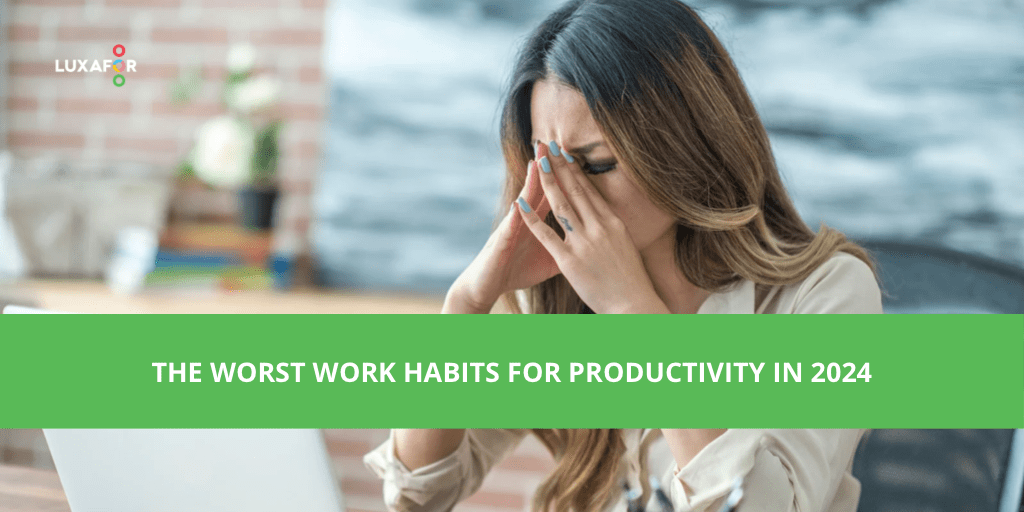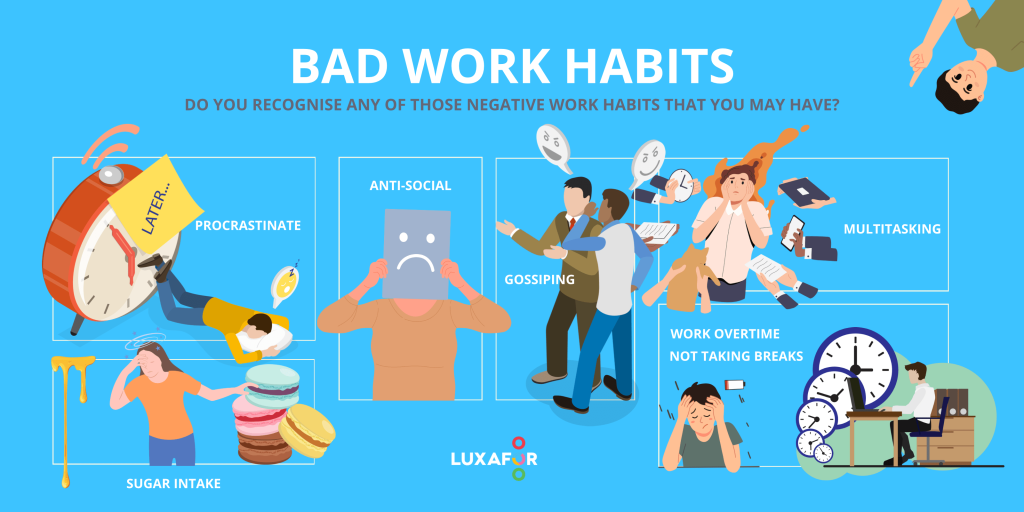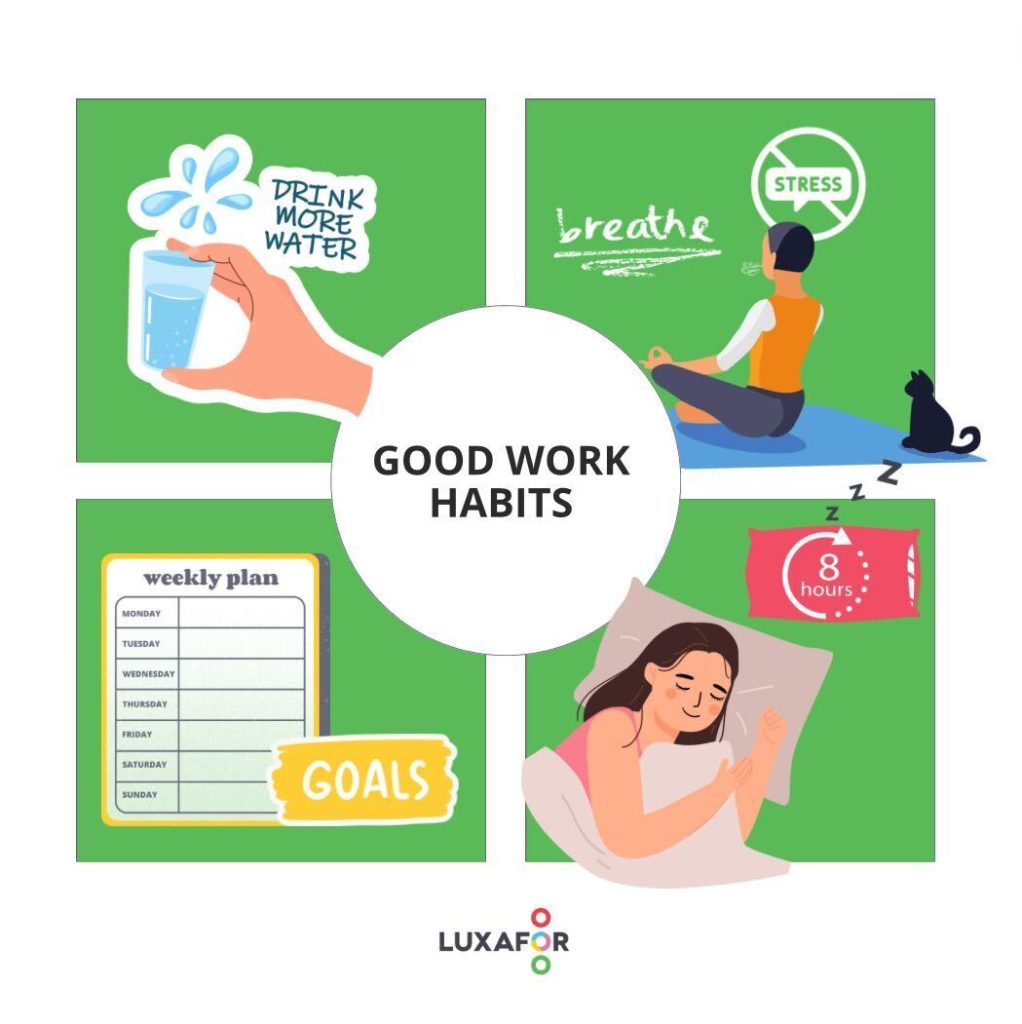The Worst Work Habits For Productivity In 2024.
Have you thought about the fact that some seemingly innocent habits can harm your productivity and health in the long run? There are powerful success habits that can improve the quality of your life, and there are “bad habits” that undermine or even completely destroy it. In this article, we have collected some of the most common work habits that you should avoid if you want to take care of your work results and well-being.
Many people have become slaves to bad habits and bow their heads to them every day. Yes, you might be thinking: I want to get rid of it, but I can’t. Today, there are various methods are recommended for fighting bad habits. Everyone, if they really want, can find something suitable for themselves.
We spend a lot of time at work, so it’s important to know what to do or better not to do for our own sake. Different habits, ways of communicating, lifestyle choices and other activities can negatively affect productivity and the overall atmosphere in your office. For this reason, we recommend that you break these 7 habits as soon as possible or make it your 2024 resolution:
1.PROCRASTINATING WHEN YOU SHOULD BE WORKING
What exactly is procrastination? Often, the word “procrastination” refers to both the tendency to postpone tasks until a later time, procrastination, and the desire not to think about unpleasant tasks for as long as possible. There is even an opinion that procrastination is simply a scientifically termed laziness. Everyone has experienced a situation at least once in their life when something needs to be done, but it is so difficult to get it done, they want to postpone the work and not think about it. Even if we know – postponement can end badly. It has been scientifically proven that we procrastinate regularly, regardless of the consequences that such behaviour might cause.
It has been discovered that people procrastinate on average 25% of their working time. Fellow people often perceive this as their disorganization or laziness, however, it is not that simple. It must be remembered that a person is not a robot that can work eight or nine hours a day without breaks or rest. However, how do you know when procrastination is becoming a real nuisance?
Have you ever faced distractions at work?
Since procrastination affects the reward mechanism when our brain produces dopamine, scientists recommend overcoming it by replacing the dopamine produced by procrastination with the idea of an even greater reward – for example, promising yourself a prize, a long-awaited purchase, a concert, an outing when the work is done. Studies have found that – this method is the most effective of the proposed techniques for overcoming procrastination. Procrastination researchers advise not to focus too much on the end result, but to look for the positive in the process of completing the task, for example, what new and interesting thing will I learn? In addition, when you start work, you will quickly feel relief and the desire to continue what you have started.
2.GOSSIP AND RUMORS IN THE WORKPLACE
As gossip can be considered as indirect violence or an emotional violence, there should be no place for gossip, rumors or useless drama at any workplace! Gossiping not only takes away your power and energy, but also distorts the flow of information and directly affects the productivity and even mental and physical health of those involved, because it is difficult and degrading beat a gossip. If no one listens to the gossip or the one spreading it and does not pass it on, the gossiper will be just a person who does not work but keeps spreading false information about others.
Why do rumors start? They start because people like to be “know-it-alls”. Knowledge holds great power, which is why even in smallest organizations people can often spread rumors. If you have heard rumors, then it is in your power to stop them so that incorrect information does not spread further. Call a meeting and share with everyone every rumor you hear, debunk the gossip with concrete facts. If you are one to immediately rush to tell others unverified information, don`t be surprised that your colleagues will not take you seriously. Rumors are an integral part of the collective, but if you are the gossiper – it can make you an unreliable colleague.
3. WORKING OVERTIME REGULARLY
There are probably periods in your professional life when working overtime even late at night or on weekends is a necessity. Maybe one of your teammates has unexpectedly resigned, and now you have to fill in for them while the manager finds someone to take over that employee’s role. Maybe the project you’re working on just has a “burning” deadline or challenges that need to be resolved asap.
For a while, the body accepts it, but over time it becomes more and more difficult to adapt. This, in turn, can cause cognitive processes to be slowed down leading to difficulty maintaining attention and disturbances in the mental sphere (e.g. burnout, anxiety, depression). If you don’t let yourself rest and sleep regularly, the result is equivalent to depriving your brain of nutrients – just like giving up food and water.
4. RELYING ON SUGAR INTAKE FOR ENERGY
Eating a chocolate bar to combat afternoon fatigue is not the best way to enhance your energy levels. What you probably don’t realize is the effects that too much sugar has on the brain. Sugar greatly increases dopamine levels (similar to other addictive substances) and the more you use it, the less dopamine your brain produces, meaning you need more and more sugar to achieve the same effect over time, which you got the first time you ate chocolate.
According to a study published in the Journal of Physiology, high amounts of sugar can negatively affect memory – a person’s ability to memorize and recall information and will create an insulin spike as well as inflammation in your body. Consuming too much sugar can lead to health problems such as obesity, diabetes, and heart disease, increasing the risk of developing dementia. Therefore reducing your sugar intake and switching to healthier food choices could have a positive impact on cognitive health.
Did you know you can easily show your colleagues when you're busy?
5. BEING ANTI-SOCIAL AT WORK
Building friendships and work relationships takes time. When your work is intense, you want to focus only on doing the work to finish what you started as quickly as possible, and invitations, for example, to lunch from colleagues can be ignored on such occasions. Conversations with colleagues at such moments seem like a waste of time. But being social is desirable, especially for optimal cognitive functioning.
A scientific study has proven that people who are more socially active experience cognitive decline 70% less often than those who are socially isolated on a daily basis. Yes, you can build your social circle outside of work, but considering the time you spend at work, there are many benefits to having friendly relationships with your colleagues. Social activity is closely related to mental and physical well-being and the ability to successfully assert and express ourselves in society. Building social connections is a prerequisite for a longer, more inclusive and active life, which also affects our productivity and quality of life.
6. NOT TAKING BREAKS WHEN YOU SHOULD
If the brain is not allowed to rest, then it becomes cluttered with all kinds of information – like filled with garbage, chaotic, unable to focus. In addition, not taking breaks can also lead to low levels of chronic stress. And according to a study published in the Journal of Neuroscience, this kind of constant low-level stress can affect your memory.
Professional burnout is very real, especially if you don’t give up seemingly harmless habits that can quickly lead to negative consequences. Checking e-mail before going to bed, reviewing the company’s social accounts in the evening hours – it seems like nothing, but over time it can lead to serious psychological fatigue. Try to forget about the existence of your phone/computer as soon as you step over the threshold of the house and focus on work matters only if it is an emergency.
7. MULTITASKING AND DOING MANY THINGS AT THE SAME TIME
There are many studies that prove that so-called multitasking is the enemy of productivity. Trying to constantly switch from one task to another will result in both tasks taking longer to complete and the quality of the work likely to be lower.
Multitaskers (or those who have a habit of multi-tasking) work at a much lower cognitive level than monotaskers (or those who prefer to do one thing at a time), and studies have also confirmed that multitaskers have lower brain density in areas which controls empathy and emotion. You might think you’re productive, but you’re not. High-quality work is a combination of two things – the time you spend at work and the intensity of your attention span during that time. If you can increase your attention span, you’ll get more done in less time.
TO CONCLUDE
Procrastination is probably one of the most common of the worst work habits listed above as we all are guilty of it many times during the day. For your own sake you have to find ways to combat procrastination. When you say no to working longer hours you will have more time for other things – be mindful about your workload so you have time to rest and recharge. Do not engage in office gossip fests and avoid gossip spreaders by all means. Multitasking is overrated so focus when you work on one task at a time – it will make you less stressed and more empowered. Some healthier lifestyle changes will pay off in the long run when you eat healthier and regularly, being more social is good for you, not only at work but outside of it – having good relationships and networking can bring more opportunities in the future.
By now you have realized that if you continue to practice these harmful habits you can compromise your well-being, productivity and even lose your job. These 7 worst work habits can seriously affect your cognitive abilities, work skills and overall productivity, so try your best to avoid them. Cognitive decline may be an inevitable part of aging, but our lifestyle habits can determine how fast it happens.
In case you notice, that you are guilty of practicing some of these habits, do yourself a favour – try to get rid of them and switch to better habits that will serve you so much better and will make you more successful and respectable professional. Also if you are willing to conquer these bad habits, we have a good read for you that will certainly help you transform bad habits for better ones. All of us are the products of our habits, you have to decide whether you will be the product of the good or the bad habits because they will eventually rule your workday.
Luxafor Flag busy light
Eliminate distractions;
Achieve deep work by controlling your workflow.
LUXAFOR HELPS PEOPLE TO ACHIEVE THEIR GREATEST PRODUCTIVITY LEVELS WITH A WIDE VARIETY OF OFFICE PRODUCTS. LET’S BE PRODUCTIVE TOGETHER!







